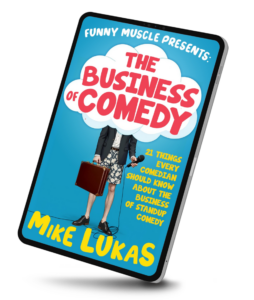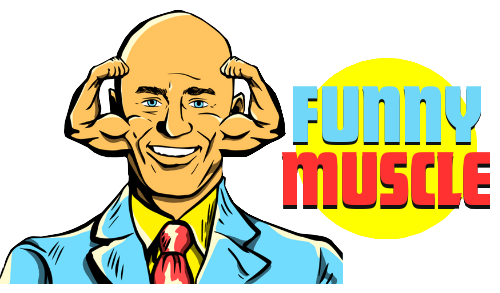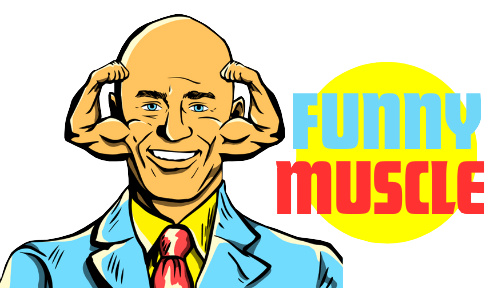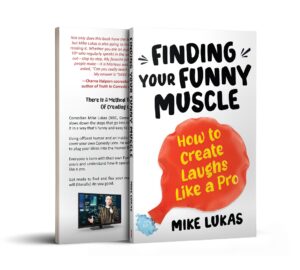“You’re either funny or you’re not.”
Well, that’s a load of shitake mushrooms.
If you can learn to play the guitar and tennis and how to cook a mushroom, you can sure as shitake learn to be funnier.
Getting better at something is simple – you just learn how that something works and practice it until it becomes second nature. If you lather, rinse, and repeat long enough you’ll get better at whatever it is you’re doing because that’s how skills develop.
Funny included.
Not saying you’ll put Mark Twain or Dave Barry out of business, but you’ll be funnier than you were.
First, though, it helps to have a clue about how a laugh is created.
In a nutshell, to write something funny, first get your reader thinking about the subject matter. Then set them up to expect a typical or normal conclusion to your thoughts. That’s when you hit them with something they weren’t expecting. The laugh comes when they ‘get’ that the unexpected “something” still satisfies that setup you just laid out.
Here’s a couple of famous examples.
Twain’s Parents
Mark Twain gets us to laugh when he writes: “Always obey your parents . . . when they are present.”
First he sets us up to think about respectfully obeying our parents constantly. i.e. Honor thy mother and father like in the Ten Commandments. But then Twain hits us with something we weren’t expecting – an exception to that “always” (you can disobey parents if they’re not right in front of you) that gives us the freedom to act up.
Which makes us laugh because we “get” that it still satisfies that setup – that I will “always” obey them when I can actually see them.
Barry’s Philosophy
Dave Barry gets a laugh when he writes: “If you had to identify, in one word, the reason why the human race has not achieved, and never will achieve, its full potential, that word would be ‘meetings.’”
First he sets us up to think philosophically about why humans haven’t reached our full potential. So many serious possibilities available – lack of priorities, limited brain power, fear. But then Dave hits us with an answer that’s the opposite of “deep” (time-wasting meetings at the office) that also explains why the human race in general can’t seem to maximize our potential.
Which makes us laugh because we “get” that it still satisfies that setup – that something in our universe is indeed preventing humans from maximizing ourselves.
Those are two humor writing masters at work – to get those types of laughs, it takes lots of practice.
Five Humor Writing Tactics to Practice
Sure, humor writing takes practice – but what the morel do you practice to get funnier?
Here are five simple laugh-creating tactics and devices from my new book Finding Your Funny Muscle that you can practice in order to help you get better at adding humor to your writing.
Humor Tactic #1: Yes-And-ing
Serious writers are usually intelligent, so they tend to debate and counter-argue scenes and themes.
Funny writers “yes, and” instead.
Meaning, when I “yes-and,” I not only agree with that first idea, but then I also take it one fun step further. This heightens whatever I’m writing about and helps me to find and play the ‘game’ (which I’ll talk more about later in this post).
Humor comes not out of denial but out of the acceptance and heightening of what’s already been set up. Yes, and-ing prevents the downward creative spiral that follows the blatant disagreement of no, but-ing. Practice yes, and-ing to spark original choices and heighten them, which can often lead to humor.
For instance, if your main character says, “These watermelons sure look ripe.”
Your funny scene goes nowhere if the other character responds with, “Actually, those are televisions.”
Or, “What do you mean, you idiot, those are rotten as hell.”
You might get a cheap laugh out of your readers, but then what? It becomes two characters battling for separate realities and the potential for a ‘funny’ conclusion is lost.
On the other hand, when your protagonist says, “These watermelons sure look ripe…”
A yes, and-er might write, “Good eye, just picked ‘em. Now help me fill ‘em with this grain alcohol.”
Or, “Dang right they’re ripe, we stole ‘em just in time.”
Or, “Hey officer, that’s my wife. Write me the ticket and leave her ripe melons out of it.”
Three totally different yes, and’s with lots of ‘funny’ potential.
Practice yes, and-ing in your writing until it becomes muscle memory for you to “accept and expand” for laughs.
Humor Tactic #2: Find and Heighten the ‘Game’
Another key to writing humor is learning how to find and heighten what’s called the “game” of your scene. By definition, a scene’s game is “a repeated pattern of funny behavior with escalating emotion.”
As the scene begins, the writer discovers a funny thing happening. Then they turn it into a game by letting the characters take turns exploring and heightening it. One of many ways to do that is by yes, and-ing what the others bring to the game, taking it all to newer and higher levels.
Playing the game is just the repeated combination of seemingly separate worlds.
Each new entry must contain a bit of both worlds to get the laugh.
For example, frogs and banks aren’t that funny, but a Frog Bank might be. The game is created by combining those worlds for laughs – withdrawing flies from your savings, an atm on a lily pad, open a new account and receive a free juicy worm, etc. Both worlds are included in each game “move.”
Some more quick examples regarding . . .
RIPE MELONS
Remember that guy in the last tactic who was filling his ripe watermelons with grain alcohol?
That’s the start of a game that could evolve in that scene as we discover he’s a functioning alcoholic. Maybe he fills other ripe items in his world with grain alcohol – the fresh tuna fish sandwich in his lunch is soaked in booze, his brand new hat carries a flask, his new tense employee is forced to do shots, his crying infant son’s bottle gets spiked…
Another game (albeit a sensitive one) could involve that rude, sexist cop in the last tactic. In this game, other “ripe food” gets used to continue sexually harassing that speeder’s wife – her fresh cucumber legs, her tender macaroni lips, those newly baked buns…you get the idea.
Practice finding the game in any funny scenes you write.
When a clever game is afoot and played well, it typically heightens into places previously unknown. That can unlock some uniquely funny ideas and scenarios that can become gloriously humorous or dark or dramatic (or in the best of cases, all the above).
Humor Tactic #3: Funny Specifics
During your practice of any of these tactics, if you come across any words or phrases that amuse you or just sound funny, write them down on a separate list. It’s good to have those words close at hand just in case you encounter the need to be more specific in your writing.
Also look for ways to replace general descriptions with more specific characterizations.
The word “vegetables” is never as funny as “pickled peppers” or “creamed corn.”
Being confused isn’t hilarious but being “bumfuzzled” might be.
And calling him “my gross teacher” is unfunny compared with “Mr. Neepe the Creep” or “Professor McNasty Pants.”
Practice finding those funny specifics and inserting them in just the right places for laughs.
Humor Tactic #4: Quirky Comparisons
A fun way to find humor is by using quirky comparisons – unexpected similes and metaphors that make a comical point.
In grade school I learned that a simile is “a figure of speech involving the comparison of one thing with another thing of a different kind, used to make a description more emphatic or vivid.” It usually contains the word “like”, “as”, “so”, or “than”, and its format typically looks like this: (x is like y)
Funny similes get us to see likenesses between two seemingly unconnected worlds.
For example, when Jeff Ross says rapper Snoop Dogg looks like a retired WNBA player.
Or when Gianmarco Soresi imagines what it would be like to choose a university major if the process was more like Shark Tank.
In each case, we laugh when we picture both images side-by-side and “get” the truth of those comparisons.
Same with funny metaphors.
A metaphor is “a thing regarded as representative or symbolic of something else, especially something abstract.” Basically it’s about the same as a simile, except you don’t use the words “like” or “as” or “than.” Instead, you make a direct comparison, which is why it’s so effective in comedy: (x is y)
Funny metaphors make a bigger point to your readers.
For example, Shane Gillis delivers the perfect comedy metaphor when he describes “Fox News as Black Church for elderly white men.”
Bill Burr further explains his views on automatic Valentine’s Day gifts for the ladies by metaphorically comparing it to “a dictatorship where tributes are demanded.”
Practice finding pertinent and unexpected connections between unrelated worlds for laughs.
Humor Tactic #5: What-If-ing
Want to become funnier?
Practice asking, “What if…?” about the normal parts of your world.
Asking “What if?” forces you to look at common things you may take for granted and twist them in a unique way that unexpectedly shakes up that normalcy.
For example, say you’re writing a scene in which there’s a long line at the bank.
Start playing “What If?”
What if one of the people waiting in line happened to be wearing a ski mask?
Or, what if one of the tellers is dying to be a famous porn actor?
Or, what if instead of money, this bank dealt in frogs and flies?
Practice what-if-ing the mundane parts of your written world. That can open up and fuel your ability to be surprising and creative and funny.
In my new humor-writing book Finding Your Funny Muscle I include a catalog of 36 Humor Heightening Devices that anyone can practice in order to become funnier.
It’s actually easier than it looks, especially if you’re willing to try it and fail and play the fool now and again.
Which, in itself, is kinda funny.
Well, for us it is.
Get your FREE copy of The Business of Comedy!

Includes:
- How Comedians are 5-Tool Players
- How to Attract a Following
- How to Get Bookings
- How to Create Multiple Income Streams
- Manager vs Agent
- And More!







Such a well written post. Thanks for these great tips! A bit of humour is needed. And someone who can write this well, is great!
Thanks Sam – appreciate you taking the time to say that. And yes, humor is SO needed (job security!)